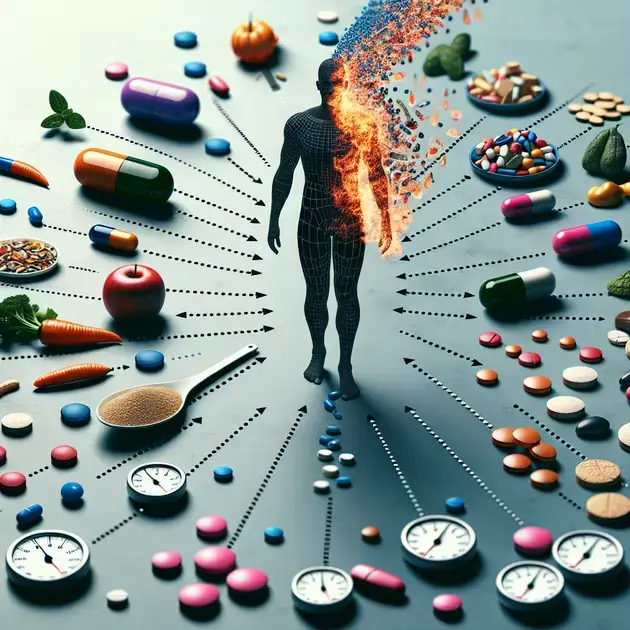Medications play a crucial role in our overall health, helping to manage various conditions and symptoms. However, it’s important to be aware of how certain medications can affect our weight loss efforts. From prescription drugs to over-the-counter supplements, the impact of medication on weight loss can vary significantly.
Adverse effects on metabolism, appetite, and nutrient absorption are some of the ways in which medications can influence weight management. For instance, certain antidepressants and corticosteroids may lead to weight gain as a side effect, making it challenging for individuals to achieve their weight loss goals. Understanding the potential impact of medication on weight loss efforts is essential for developing a comprehensive and effective weight management plan.
How Medications Affect Metabolism and Appetite
Medications can have a significant impact on our metabolism and appetite, affecting our body’s ability to burn calories efficiently and regulate hunger cues. Understanding how different medications influence these processes is crucial for individuals looking to manage their weight effectively. One way to track these effects is by using health monitoring apps like MyFitnessPal, which allows users to input their medications and monitor changes in weight and appetite over time.
Certain medications, such as antidepressants or antipsychotics, are known to cause weight gain by altering metabolic processes or increasing appetite. To counteract these effects, individuals can consult with their healthcare provider to explore alternative medications or adjust their current dosage. Apps like Mango Health can help users set medication reminders and provide information on potential side effects related to weight management.
In addition to medications directly impacting metabolism and appetite, certain health conditions may also play a role in weight changes. Apps like Fooducate can help individuals track their food intake and identify any patterns related to medication use or underlying health issues affecting metabolism. By keeping a detailed food journal, users can work with their healthcare team to make necessary changes to their treatment plan.
It’s essential for individuals taking medications that affect metabolism and appetite to prioritize regular exercise and a balanced diet to support their overall health and weight management goals. Fitness apps like Fitbit can assist users in setting activity goals, tracking their progress, and syncing with their medication and food intake data to provide a comprehensive overview of their health journey. By staying mindful of their body’s responses to medications and making informed lifestyle choices, individuals can work towards maintaining a healthy weight despite these potential challenges.
Tracking the effects of medications on metabolism and appetite is a continuous process that requires patience and proactive communication with healthcare providers. Utilizing technology and health apps can empower individuals to take control of their weight management journey and make informed decisions to support their overall well-being.
The Role of Prescription Drugs and Supplements in Weight Management
Prescription drugs and supplements play a crucial role in weight management by targeting specific aspects of metabolism, appetite, or nutrient absorption to support individuals in achieving their health goals. Understanding how these medications work and integrating them effectively into a comprehensive weight management plan is essential for long-term success. Apps like MyPlate Calorie Counter can help users track their nutrient intake and supplement usage to ensure they are meeting their dietary needs.
Prescription weight loss medications, such as orlistat or phentermine, work by inhibiting fat absorption or suppressing appetite to aid individuals in losing weight. By discussing the potential benefits and risks of these medications with their healthcare provider, individuals can make informed decisions about incorporating them into their weight management strategy. Apps like Lose It! can provide personalized recommendations based on users’ weight loss goals and medication regimens to optimize their results.
Supplements like green tea extract or conjugated linoleic acid are popular choices for individuals seeking natural ways to support their weight loss journey. While these supplements may offer some benefits, it’s crucial to research their efficacy and safety before adding them to your routine. Apps like GoodGuide can help users evaluate the quality and transparency of supplement products to make informed purchasing decisions.
Combining prescription drugs and supplements with lifestyle modifications, such as regular exercise and mindful eating, can enhance the effectiveness of a weight management plan. Fitness and nutrition apps like 8fit can provide users with workout routines and meal plans tailored to their individual needs, ensuring a holistic approach to achieving and maintaining a healthy weight. By leveraging the synergistic effects of medications, supplements, and lifestyle changes, individuals can optimize their weight management efforts and improve their overall well-being.
It’s essential for individuals using prescription drugs and supplements for weight management to stay informed about potential interactions, side effects, and long-term considerations. By staying proactive in their health journey and leveraging the support of healthcare professionals and digital tools, individuals can navigate the complexities of weight management with confidence and achieve sustainable results.
Navigating Weight Loss Challenges Caused by Medications
Weight loss challenges can arise when medications introduce obstacles such as increased appetite, decreased metabolism, or changes in nutrient absorption. Navigating these challenges effectively requires a multifaceted approach that addresses the root causes of weight gain while optimizing the benefits of medication therapy. Apps like Fooducate can help users identify nutrient-dense foods that align with their dietary requirements and health goals despite the challenges posed by medications.
One strategy for overcoming weight loss challenges caused by medications is to work closely with a healthcare provider to monitor progress, adjust dosages if necessary, and explore alternative treatment options. Apps like Mango Health can assist users in tracking their medication adherence and communicating with their healthcare team about any concerns or changes in weight and appetite. By staying proactive in managing medication-related weight changes, individuals can collaborate with their healthcare providers to find solutions that support their overall well-being.
Engaging in regular physical activity is another key component of overcoming weight loss challenges induced by medications, as exercise can help boost metabolism, regulate appetite, and support overall weight management efforts. Fitness apps like Nike Training Club can provide users with guided workout sessions tailored to their fitness level and goals, making it easier to incorporate exercise into their daily routine despite any medication-related challenges. By prioritizing movement and staying active, individuals can counteract the impact of medications on their metabolism and appetite.
Monitoring progress and celebrating non-scale victories are essential aspects of navigating weight loss challenges caused by medications. Apps like Happy Scale can help users track their weight changes over time, set realistic goals, and focus on the positive achievements along the way. By shifting the focus from numbers on the scale to overall health improvements and lifestyle changes, individuals can maintain motivation and stay committed to their weight loss journey despite the hurdles posed by medications.
Seeking support from online communities or forums dedicated to individuals facing similar medication-related weight challenges can provide valuable insight, encouragement, and tips for overcoming obstacles. Apps like MyFitnessPal’s community feature can connect users with peers who share their experiences and offer support and advice along their weight loss journey. By building a strong support network and leveraging digital platforms, individuals can navigate weight loss challenges caused by medications with resilience and determination, ultimately achieving their desired outcomes.
Potential Side Effects of Medications on Body Composition
When it comes to managing weight and body composition, it’s important to consider the potential side effects of medications. Certain medications can have a direct impact on how our bodies store and use energy, which can in turn affect our weight and overall body composition.
For example, some medications may cause weight gain as a side effect. This can be due to a variety of reasons, such as increased appetite, changes in metabolism, or water retention. On the other hand, some medications may lead to weight loss, either through appetite suppression or increased calorie burning.
It’s crucial to consult with a healthcare provider or pharmacist when starting a new medication to understand the potential side effects on body composition. They can provide valuable insights and recommendations on how to manage any changes in weight that may occur.
Overall, being aware of the potential side effects of medications on body composition can help individuals make informed decisions about their weight management strategies and adjust their approach accordingly.
Optimizing Weight Loss Strategies with Medication Use
When it comes to optimizing weight loss strategies, incorporating medication use can be a helpful tool for some individuals. Medications designed to aid in weight loss can provide extra support for those struggling to lose weight through diet and exercise alone.
It’s important to note that medication should not be seen as a standalone solution for weight loss, but rather as part of a comprehensive approach that includes healthy eating, regular physical activity, and lifestyle changes. Working with a healthcare provider to develop a personalized weight loss plan that includes medication use can help maximize results.
Individuals considering medication for weight loss should be aware of the potential side effects and risks involved. It’s crucial to weigh the benefits and drawbacks of using weight loss medications and make an informed decision based on individual health needs and goals.
By optimizing weight loss strategies with medication use, individuals may find it easier to achieve and maintain their weight loss goals in a safe and effective manner.
Balancing Medication Needs with Weight Management Goals
One of the key considerations when managing both medication needs and weight management goals is finding a balance that works for the individual. Certain medications may have side effects that impact weight, while weight management strategies may also influence medication effectiveness.
It’s essential for individuals to communicate openly with their healthcare providers about any concerns or challenges related to medication and weight management. A collaborative approach can help address potential conflicts and develop strategies to balance medication needs with weight management goals effectively.
Adjusting medication doses or exploring alternative medications with fewer side effects on weight may be options to consider for individuals facing challenges in balancing medication needs with weight management goals.
Overall, finding the right balance between medication needs and weight management goals is a personalized journey that requires ongoing communication, monitoring, and adjustment to optimize both health outcomes and weight management success.
Conclusion
In conclusion, understanding the potential side effects of medications on body composition is essential for individuals looking to manage their weight effectively. Medications can have varying impacts on weight, with some leading to weight gain while others may facilitate weight loss. Consulting healthcare professionals before starting a new medication is crucial to grasp how it might affect body composition and receive guidance on managing any weight-related changes.
Moreover, incorporating medication into weight loss strategies can be beneficial, but it should be part of a comprehensive approach that includes healthy eating and regular exercise. Individuals considering weight loss medications must carefully weigh the benefits and risks, making informed decisions aligned with their health goals. By optimizing weight loss strategies with medication under professional guidance, individuals can enhance their chances of achieving sustainable weight loss.
When balancing medication needs with weight management goals, open communication with healthcare providers is key. Finding the right equilibrium between medication effects on weight and weight management strategies is a personalized journey that requires ongoing monitoring and adjustments. Considering alternative medications with fewer weight-related side effects or modifying doses can help individuals address challenges and optimize both their health outcomes and weight management success.

